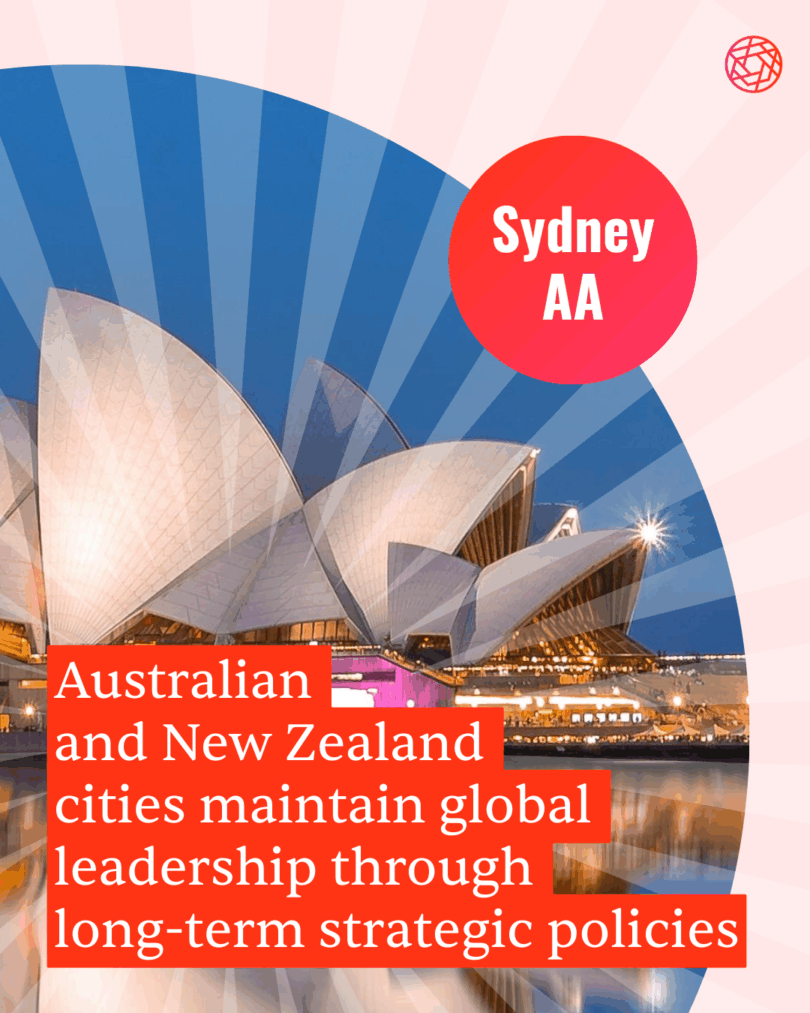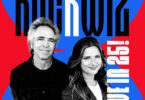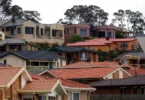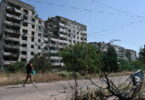SYDNEY SOARS IN NEW GLOBAL RANKINGS ON BOTH ECONOMIC COMPETITIVENESS AND LGBTQ+ INCLUSION
25 april,2025
-
Australian cities ‘top of the class’ in Asia Pacific in Open for Business ‘City Ratings’, a ranking of 149 global cities, measuring economic competitiveness and LGBTQ+ inclusion, with Sydney, Brisbane, Melbourne, and Perth the only ones to rank ‘AA’’
-
New data shows human capital up to four times higher for LGBTQ+ inclusive cities, states new data
-
Entrepreneurship can double for LGBTQ+ inclusive cities, as can economic competitiveness
-
Copenhagen named ‘most open for business’ out of 149 cities
Sydney has swept up across Asia Pacific, in a global ranking on economic competitiveness and LGBTQ+ inclusion, released today by Open for Business, who represent a coalition of global businesses and specialise in the economic case for inclusion.
The City Ratings report, produced by Open for Business with data partner Oxford Economics, scores 149 cities using a number of indicators taken from reliable and robust data sources. Sydney, alongside Melbourne, Brisbane and Perth rank ‘AA’, which is higher than any other city in the region, and alongside global peers including London, New York and Dublin. Adelaide scores an impressive ‘A’ grade, placing it alongside regional peers Singapore, Auckland and Wellington. All other cities in Asia Pacific have scored below this. The City Ratings rank from ‘AAA’ to ‘EE’, and rankings are composed of equal amounts from both categories: economic competitiveness and LGBTQ+ inclusion.
Open for Business’ report includes a number of new data sets that point to positive correlations between LGBTQ+ inclusion and human capital, entrepreneurship and economic competitiveness. The report finds that LGBTQ+ inclusion can lead to 4x stronger human capital, 2.5x levels of entrepreneurship and 2.3x economic competitiveness, compared to cities that are less inclusive.
The report cites “traditional strengths in education and quality of life, while developing new capabilities in areas like financial technology and creative industries” for such strong performance across Australian cities. It continues: “their success demonstrates how long-term investment in both physical and social infrastructure creates resilient urban environments. These cities’ consistent performance reflects decades of intentional policy choices around diversity and inclusion, supported by strong democratic institutions and civil society organisations.”
Despite this, the report cites that challenges including housing affordability and integration of international students and workers should not be ignored. “Their experience suggests that maintaining high ratings requires constant attention to emerging social and economic challenges”.
Open for Business’ City Ratings report presents comprehensive data supporting its assertions through analysis of key urban metrics. These include business environment accessibility, network readiness, corruption levels, innovation ecosystem health, quality of life standards, and LGBTQ+ inclusivity and legal protections.
This data has been synthesised into the Open for Business City Ratings, which combines 27 individual indicators from a number of well-respected data sources to produce a picture of which cities are open, progressive and competitive, and which are not.
Paul Donovan, UBS Global Wealth Management, said: “The mantra for economic success in any company, city, or country is “right person, right job, right time.” Prejudiced economies that reject 10 per cent or more of their population because they are LGBTQ+ are guaranteed to get this wrong. Including the talent that this population represents by creating an inclusive culture will inevitably increase entrepreneurship and innovation by broadening the talent pool.”

Dominic Arnall, CEO, Open for Business said: “In 2023, the 1,000 largest cities in the world accounted for 60% of global GDP and over 30% of the world’s population.“Furthermore, research consistently demonstrates that more inclusive cities tend to attract top talent, foster innovation, and build more resilient economies. The correlation between LGBTQ+ inclusion and economic vitality is particularly evident, with more inclusive cities showing higher rates of innovation, stronger human capital development, and greater success in attracting international investment.”
About this Report
Open for Business’ City Ratings are determined by a combination of 27 metrics from a number of well-respected sources.
Each city receives a final score, which corresponds to a rating. These comprise a combination of economic competitiveness and LGBTQ+ inclusiveness, each comprising a number of sub-categories: economic performance, innovation, business environment, human capital and entrepreneurship and, for LGBTQ+ inclusion, social attitudes and legal situation.
Asia and Pacific
-
Bangkok has moved up in the ratings following Thailand’s 2024 legalisation of same-sex marriage. However, despite progressive visa policies and support for LGBTQ+ businesses, workplace discrimination for trans people in particular remains a problem. Bangkok also faces broader economic headwinds, in relation to corruption among other indicators.
-
Cities in India show progress on LGBTQ+ inclusion thanks to increasingly progressive legislation and sustained business action. The country has launched an Education Equality Index (2024) and National Transgender Awards (2023) in recent years, as well as the Department of Financial Services clarifying that LGBTQ+ individuals face no restrictions in opening joint bank accounts. Deloitte’s recent survey on LGBT+ Inclusion at Work in India shows that Indian employees exceed global averages in workplace comfort regarding sexual orientation discourse.
-
Singapore and Hong Kong demonstrate extraordinary economic performance but face ongoing social inclusion challenges. Both cities highlight the complex relationship between openness and social inclusion, positioning themselves as global financial centres while maintaining distinct approaches to social issues. However, to compete on a knife’s edge with other global competitors, progress on inclusion would perhaps strengthen numerous economic indicators for both of these cities.
-
Australian and New Zealand cities dominate the ratings in this region. These cities have built on traditional strengths such as education and qualities of life while developing new capabilities like financial technology and creative industries. Their policies on LGBTQ+ inclusion have been strong and supportive for decades.
Central and Eastern Europe
-
Prague leads the region, demonstrating strong social acceptance and balanced economic metrics, particularly in the technology sector, specifically fintech and artificial intelligence. While the Czech Republic legalised civil unions in 2006, full marriage equality remains a work in progress. This characterises Prague’s broader social landscape, making them “partially open for business”.
-
Continued improvements across Polish cities show how far the country has come, in particular on LGBTQ+ inclusion, despite past national policies. This is the case in particular for Warsaw, but also in Wroclaw and Kraków, the latter through initiatives like the in-school Rainbow Fridays.
-
Both Belgrade and Budapest share similar challenges: emerging as relative havens of inclusion that attract international business and talent, while sitting against a more challenging national backdrop. For Hungary, this includes laws that have had a negative impact on LGBTQ+ people, and in Serbia what appear to be underreported levels of hate crime against the community.
US and Canada
All US cities maintain consistently high scores across all metrics, the largest gap being in human capital, indicating a remarkable ability to attract and retain talent. The smallest gap is in LGBTQ+ inclusion, suggesting that other global hubs are catching up on this metric. What this could mean is that any roll back in LGBTQ+ inclusion for US cities could lead to them losing a competitive edge, including in terms of talent attraction and retention, to other cities that demonstrate both economic and inclusion-focused strengths.
Western Europe
-
UK cities face a historic downgrade on LGBTQ+ inclusion, which in turn has led to the likes of London falling below ‘AAA’ status since the first City Ratings report in 2018. This comes down to both a shift in societal attitudes and an 11 percent year-over-year increase in anti-LGBTQ+ hate crimes.
-
Swiss cities dominate the top tier of the City Ratings with an impressive showing from Zurich, Geneva and Basel. Driven by the country’s recent legalisation of same-sex marriage, the unique concentration of high-performing Swiss cities reflects the country’s distinctive approach to combining innovation, economic excellence, and increasingly progressive social policies.
Latin America and the Caribbean
-
Brazilian cities maintain their positions in this year’s ratings, with Sao Paulo (ranked ‘B’) leading as the economic powerhouse of Latin America, with the highest business environment score in the region.
-
Buenos Aires has maintained its ‘B’ rating, demonstrating resilience in balancing progressive social policies with Argentina’s dramatic economic reforms. The capital remains a regional leader for LGBTQ+ rights, with a stable legal foundation despite broader political changes.
-
Several Caribbean nations have achieved landmark rulings in decriminalization, creating precedents for business equality. Kingston’s improvement stands out, despite it having more restrictive legal frameworks than many peers. This progress has been driven by groups such as J-FLAG, demonstrating how grassroots movements can advance inclusion even in traditionally conservative societies.








